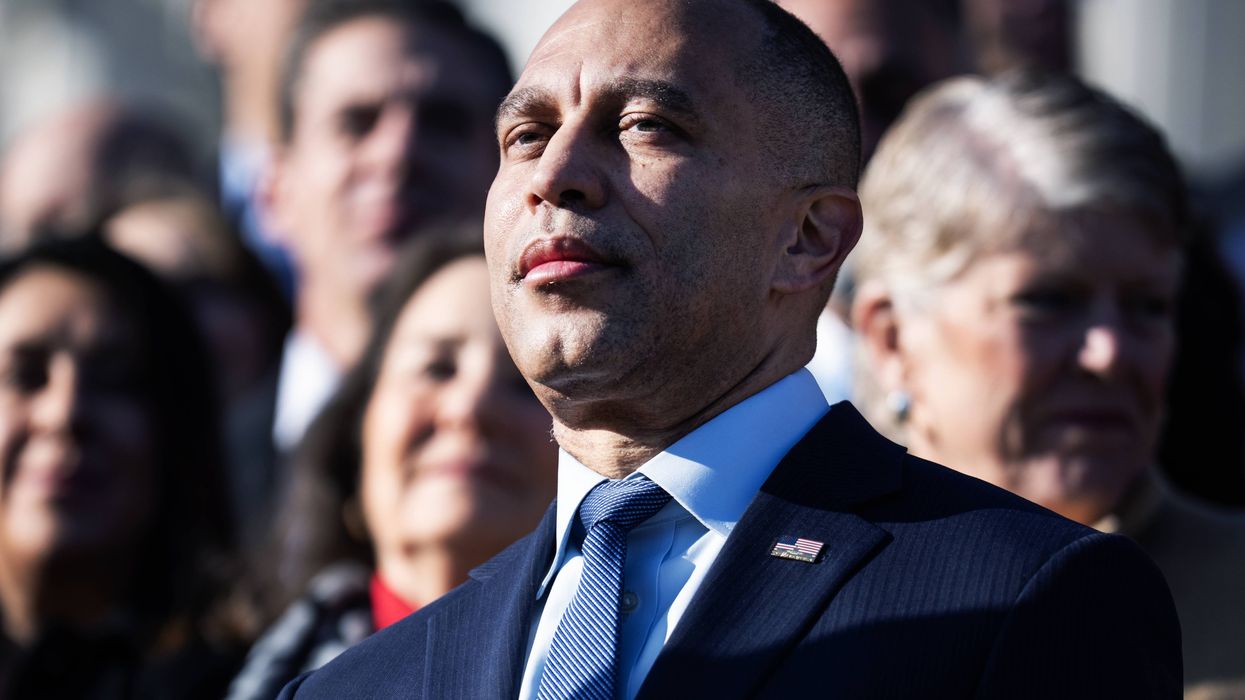March, 07 2012, 11:02am EDT

Privatized Meat Inspection Experiment Jeopardizes Food Safety
In the name of budget-cutting, more defective and unsanitary poultry contaminated with feathers, bile and feces could make its way to consumers if the USDA's controversial pilot project for privatized inspection in poultry slaughter plants is expanded. Today the national consumer group Food & Water Watch released an analysis of the USDA's HACCP-based Inspection Models Project (HIMP) that reveals large numbers of defects are routinely being missed when inspection tasks are performed by company employees instead of USDA inspectors.
WASHINGTON
In the name of budget-cutting, more defective and unsanitary poultry contaminated with feathers, bile and feces could make its way to consumers if the USDA's controversial pilot project for privatized inspection in poultry slaughter plants is expanded. Today the national consumer group Food & Water Watch released an analysis of the USDA's HACCP-based Inspection Models Project (HIMP) that reveals large numbers of defects are routinely being missed when inspection tasks are performed by company employees instead of USDA inspectors.
"Based on the data coming out of the plants where this privatized inspection scheme is already in place, it is unacceptable for USDA to try to expand this program to more plants," said Wenonah Hauter, executive director of Food & Water Watch. "As the House Agriculture Appropriations subcommittee hears from USDA tomorrow about their plans for meat and poultry inspection, we hope that they ask tough questions about why USDA is planning to leave consumers at risk to save money."
The USDA has been running the pilot project with privatized inspection in two-dozen slaughter facilities since 1998. USDA is proposing an expansion of the pilot to all poultry slaughter plants, and forecasts that over three years this change will save $90 million through the elimination over 800 inspector positions. And, since most poultry plants will be able to increase their production line speeds to 175 birds per minute, the industry expects to save an estimated $256.6 million in production costs.
Poultry plants involved in the HIMP pilot have been granted line speed waivers. Some plants in the pilot have operated at line speeds upwards of 200 birds per minute, compared to 35 birds per minute for which each USDA inspector is responsible for in plants receiving conventional inspection.
Part of the pilot project is a verification program that samples between 20 to 80 birds per slaughter line during an eight-hour shift to check for defects missed by company employees. Thousands of poultry carcasses may be processed on each line during any given shift of production. The defects fall into seven different categories; two are considered 'Food Safety' issues and the other five are considered to be 'Other Consumer Protection' issues.
Using the Freedom of Information Act, Food & Water Watch obtained verification inspection documents (HIMP Form 1) and non-compliance reports (NRs) for 14 poultry plants involved in the HACCP-based Inspection Models Project (HIMP) from January 1, 2011 through August 2011 for the first shift of production. The USDA supplied more than 5,000 pages of documents, which revealed:
- Company employees miss many defects in poultry carcasses. The inspection category that had the highest error rate was 'Other Consumer Protection 4' for dressing defects such as feathers, lungs, oil glands, trachea and bile still on the carcass. The average error rate for this category in the chicken slaughter facilities was 64 percent and 87 percent in turkey slaughter facilities. In one turkey slaughter facility, nearly 100 percent of samples found this category of defect.
- The data showed wide variation in the number of defects missed from plant-to-plant. There seems to be no consistency across the industry.
- The overwhelming number of non-compliance records filed for the 14 plants was for fecal contamination found on the carcasses. Out of 229 NRs filed from March to August 2011, 208 (90%) were for visible fecal contamination that was missed by company employees.
- One notable NR stated, "I observed a section of intestine wrapped around the rotating paddles in the neck chiller. The intestine was approximately 1 1/2 feet in length, contained fecal material. Additionally, numerous other pieces (of) digestive tract materials, such as chicken crops and esophagus were also observed in the neck chiller...This regulatory noncompliance would potentially allow for the cross contamination of necks by digestive contents material such as ingesta and/or feces."
"USDA inspectors receive extensive training to protect public health in poultry facilities, but there is no similar requirement for company employees to receive training before they assume these inspection responsibilities in the proposed privatized inspection system," said Hauter. "USDA's proposal to shift this public health responsibility to company employees is a budget-cutting maneuver that puts consumers at risk."
Non-Compliance Reports and Plant Performance Results can be found here.
Food & Water Watch mobilizes regular people to build political power to move bold and uncompromised solutions to the most pressing food, water, and climate problems of our time. We work to protect people's health, communities, and democracy from the growing destructive power of the most powerful economic interests.
(202) 683-2500LATEST NEWS
Democrats to Spotlight Trump Election Threats at January 6 Hearing
A panel aimed at fighting GOP efforts to "rewrite history" regarding the US Capitol attack will also "examine ongoing threats to free and fair elections posed by an out-of-control Trump administration."
Dec 30, 2025
At a hearing on the fifth anniversary of the January 6, 2021 attack on the US Capitol next week, House Democrats plan to look back as well as forward—countering Republicans' efforts to "rewrite history and whitewash" the attempted insurrection by President Donald Trump's supporters and warning of the GOP's threats to upcoming elections and to US democracy.
The event next Tuesday will be an unofficial one, as Democrats are in the minority and do not have the authority to call formal hearings.
House Minority Leader Hakeem Jeffries (D-NY) said in a Dear Colleague letter to other lawmakers on Monday that the hearing would shed light on the "toxic priorities" of Trump, who after taking office in January issued blanket pardons for nearly 1,600 people who were charged in connection to the January 6 attack.
" Donald Trump promised to lower the high cost of living on day one of his presidency," wrote Jeffries. "One year later, costs are out of control, America is too expensive, and Republicans believe that the affordability crisis is a hoax. They have done nothing to lower costs for everyday Americans, but are gutting healthcare and enacted massive tax breaks for their billionaire donors."
While doing nothing to make life more affordable for families—and helping to make household grocery and electricity bills higher—Trump has pardoned hundreds of people who "brutally assaulted law enforcement officers" on January 6, including several who have been charged with new crimes and "a troubling number" who "have been arrested for child molestation, sexual assault, and kidnapping," said the Democratic leader.
"Republicans own the failed economy, their broken promise to lower costs, and the crime spree the dangerous criminals pardoned by the president have visited on our country," wrote Jeffries.
The mob on January 6 attempted to stop the certification of the 2020 election, which Trump had spent weeks at that point insisting had been stolen from him and which the president and his allies continue to deny was won by former President Joe Biden.
But Republicans including House Speaker Mike Johnson (R-La.) have made efforts to sanitize the attack, which took place after Trump held a rally urging his supporters to march "over to the Capitol building to peacefully and patriotically make your voices heard" and said they would see whether "Republicans stand strong for integrity of our elections."
After Trump took office this year, Johnson announced a new congressional subcommittee that would expose "the false narratives peddled by” the previous bipartisan panel that issued a report in 2022 about Trump's efforts to overturn the 2020 election results and his encouragement of the attack.
Rep. Bennie Thompson (D-Miss.), who led the bipartisan committee, will also oversee next Tuesday's hearing.
In addition to exposing "the election deniers who hold high-level positions of significance in the executive branch," wrote Jeffries on Monday, the panel "will examine ongoing threats to free and fair elections posed by an out-of-control Trump administration."
The president has pushed Republican-led state legislatures in Texas, Missouri, North Carolina, and other states to draw new congressional maps to help the GOP maintain power in the 2026 midterm elections.
He signed an executive order in March that purported to require proof of citizenship for people who register to vote—an effort that was blocked by a federal judge in October—and the US Department of Justice has sued several states to compel them to share voter registration data with the federal government.
Legal experts have emphasized that the president does not have the authority to change how elections are run, despite Trump's continued efforts.
Jeffries said the January 6th Select Committee would join Thompson in leading the hearing, which is scheduled for 10:00 am Eastern time next Tuesday.
Keep ReadingShow Less
'This Is an Act of War': CIA Carried Out Drone Strike on Port Facility Inside Venezuela
One expert called the reported drone strike a "violation of Article 2(4) of the UN Charter and the Take Care Clause of the Constitution."
Dec 30, 2025
The US Central Intelligence Agency reportedly carried out a drone strike earlier this month on a port facility inside Venezuela, marking the first time the Trump administration launched an attack within the South American country amid a broader military campaign that observers fear could lead to war.
CNN on Monday was first to report the details of the CIA drone strike, days after President Donald Trump suggested in a radio interview that the US recently took out a "big facility" in Venezuela, prompting confusion and alarm. Trump authorized covert CIA action against Venezuela in October.
According to CNN, which cited unnamed sources, the drone strike "targeted a remote dock on the Venezuelan coast that the US government believed was being used by the Venezuelan gang Tren de Aragua to store drugs and move them onto boats for onward shipping."
To date, the Trump administration has not provided any evidence to support its claim that boats it has illegally bombed in international waters were involved in drug trafficking. No casualties were reported from the drone strike, and the Venezuelan government has not publicly commented on the attack.
"This is an act of war and illegal under both US and international law, let’s just be clear about that," journalist Mehdi Hasan wrote in response to news of the drone strike.
Brian Finucane, senior adviser with the US Program at the International Crisis Group, called the reported drone attack a "violation of Article 2(4) of the UN Charter and the Take Care Clause of the Constitution."
"Seemingly conducted as covert action and then casually disclosed by POTUS while calling into a radio show," he added.
CNN's reporting, later corroborated by the New York Times, came after the Trump administration launched its 30th strike on a vessel in international waters, bringing the death toll from the lawless military campaign to at least 107.
The Times reported late Monday that "it is not clear" if the drone used in last week's mission "was owned by the CIA or borrowed from the US military."
"The Pentagon has stationed several MQ-9 Reaper drones, which carry Hellfire missiles, at bases in Puerto Rico as part of the pressure campaign," the Times added.
Keep ReadingShow Less
30th Strike in Trump's High-Seas Kill Spree Claims 2 More Lives
At least 107 people have been killed in US bombings of boats that the Trump administration claims—without evidence—were involved in narco-trafficking in the Caribbean Sea and Pacific Ocean.
Dec 29, 2025
The US military said Monday that two alleged drug smugglers were killed in the bombing of another boat in the eastern Pacific Ocean, but—as has been the case throughout 30 such strikes—offered no verifiable evidence to support its claim.
US Southern Command (SOUTHCOM) said on X that, on orders from Defense Secretary Pete Hegseth, "Joint Task Force Southern Spear conducted a lethal kinetic strike on a vessel operated by Designated Terrorist Organizations in international waters."
"Intelligence confirmed the vessel was transiting along known narco-trafficking routes in the eastern Pacific and was engaged in narco-trafficking operations," SOUTHCOM added. "Two male narco-terrorists were killed. No US military forces were harmed."
According to the Trump administration's figures, at least 107 people have been killed in 30 boat strikes since early September. The administration has tried to justify the strikes to Congress by claiming that the US is in an “armed conflict” with drug cartels, while legal scholars and Democratic US lawmakers counter that the bombings are likely war crimes.
War powers resolutions aimed at reining in President Donald Trump’s ability to extrajudicially execute alleged drug traffickers in or near Venezuela failed to pass the Senate in October and the House earlier this month.
Monday's strike came amid Trump's escalating aggression against Venezuela, including the deployment of warships and thousands of US troops to the region, authorization of covert CIA operations targeting the country's socialist government, and threats to launch ground attacks.
Trump claimed Monday without providing evidence that US forces destroyed a "big facility" in an unspecified country where narco-traffickers' "ships come from."
Keep ReadingShow Less
Most Popular


